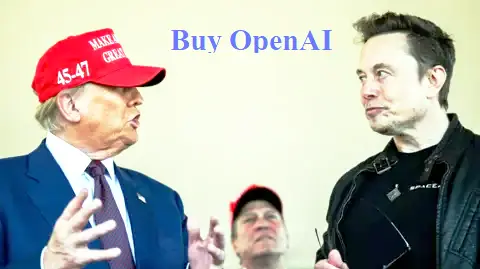
In a move that has sent shockwaves through the tech world, Elon Musk has reportedly spearheaded a staggering $97.4 billion bid to take control of OpenAI, the groundbreaking artificial intelligence research organization he co-founded in 2015. This audacious attempt marks a pivotal moment in the evolution of AI, raising critical questions about the future of the technology, its governance, and the ethical implications of placing such immense power in the hands of a single visionary or, as some might argue, a single individual.
Why Elon Musk Wants Control of OpenAI
Elon Musk’s $97.4 billion bid to control OpenAI isn’t just a business move it’s a statement. As one of the original co-founders of OpenAI, Musk has long been a vocal advocate for the responsible development of artificial intelligence. His concerns about the existential risks posed by unchecked AI are well-documented. In fact, Musk has repeatedly warned that AI could become “more dangerous than nukes” if not properly regulated.
But why now? Insiders suggest that Musk’s bid is a response to OpenAI’s recent strategic shifts. The organization, which started as a non-profit dedicated to open-source AI research, has increasingly partnered with corporate entities and moved toward a capped-profit model. While these changes have allowed OpenAI to secure funding for ambitious projects like GPT-4, they’ve also raised questions about the organization’s commitment to its original mission. Musk’s bid is seen as an attempt to steer OpenAI back toward its founding principles of transparency, safety, and broad societal benefit.
The Ethical Implications of AI Centralization
Musk’s bid has sparked a heated debate about the ethics of centralizing control over AI development. On one hand, Musk’s leadership could bring much-needed focus on AI safety and ethical considerations. His track record with companies like Tesla and SpaceX demonstrates his ability to tackle complex challenges and drive innovation at scale. By taking control of OpenAI, Musk could accelerate breakthroughs in AI safety protocols and ensure that the technology is developed in a way that aligns with human values.
On the other hand, critics argue that concentrating power in the hands of a single individual no matter how visionary could have unintended consequences. AI development thrives on collaboration and the free exchange of ideas. Centralizing control could stifle diversity of thought and create a single point of failure. Moreover, Musk’s ambitious vision for AI might overshadow alternative perspectives, potentially leading to a narrow approach to AI development.
What This Means for the Future of AI
The outcome of Musk’s bid could have far-reaching implications for the future of AI. If successful, it could reshape the landscape of AI research and development, placing a stronger emphasis on safety and ethical considerations. Musk’s influence could also attract top talent and significant investment, further accelerating OpenAI’s progress.
However, the bid also highlights the growing commodification of AI. As the technology becomes increasingly central to global economies, the stakes for controlling its development have never been higher. This raises critical questions about who gets to decide the future of AI and how those decisions will impact society at large. Will AI remain a force for good, or will it become a tool for consolidating power and wealth?
Also Read : How to Make Money Through Deepseek: Unlocking New Opportunities in the Digital Age
The Genesis of OpenAI: A Noble Mission
OpenAI was born out of a shared vision to ensure that artificial general intelligence (AGI) benefits all of humanity. Musk, along with co-founders like Sam Altman and others, established the organization as a counterbalance to the growing influence of tech giants like Google and Facebook in the AI space. The goal was clear: to develop AI in a way that is safe, transparent, and aligned with human values. OpenAI’s commitment to open-source principles and its focus on ethical AI quickly made it a beacon of hope in an industry often criticized for its lack of accountability.
But as the years passed, OpenAI’s mission began to shift. The organization transitioned from a purely non-profit entity to a “capped-profit” model, allowing it to attract significant investment while still adhering to its core principles. This shift, while necessary to fund its ambitious projects, also opened the door to questions about who ultimately controls the direction of OpenAI and by extension, the future of AI.
Musk’s Bold Gambit: A Bid for Control
Elon Musk’s $97.4 billion bid to take control of OpenAI is nothing short of monumental. For context, this figure eclipses the GDP of many small nations and underscores the immense value Musk places on shaping the trajectory of AI development. But why now? And what does this mean for OpenAI’s future?
Sources close to the matter suggest that Musk’s bid is driven by a combination of strategic foresight and personal conviction. As one of the most vocal advocates for AI safety, Musk has repeatedly warned about the existential risks posed by unchecked AI development. His involvement in OpenAI was initially motivated by a desire to ensure that AI remains a force for good. However, in recent years, Musk has grown increasingly concerned about the direction of the organization, particularly its partnerships with major corporations and its perceived drift away from its original mission.
By taking control, Musk aims to realign OpenAI with its founding principles, prioritizing safety, transparency, and the democratization of AI technology. Critics, however, argue that this move could centralize power in the hands of a single individual, potentially undermining the collaborative spirit that has defined OpenAI’s success.
Also read : Discover Bank Business Loans: A Complete Guide to Financing Your Business Growth
The Implications: A Double-Edged Sword
Musk’s bid raises profound questions about the governance of AI and the balance of power in the tech industry. On one hand, his leadership could accelerate breakthroughs in AI safety and ethics, ensuring that the technology is developed responsibly. Musk’s track record with companies like Tesla and SpaceX demonstrates his ability to tackle complex challenges and drive innovation at an unprecedented scale.
On the other hand, critics warn that concentrating control of OpenAI in Musk’s hands could stifle diversity of thought and create a single point of failure. AI development thrives on collaboration and the free exchange of ideas, and there is a risk that Musk’s vision however well-intentioned could overshadow alternative perspectives.
Moreover, the sheer scale of Musk’s bid highlights the growing commodification of AI. As the technology becomes increasingly central to global economies, the stakes for controlling its development have never been higher. This raises ethical concerns about who gets to decide the future of AI and how those decisions will impact society at large.
The Road Ahead: A Defining Moment for AI
Elon Musk’s $97.4 billion bid to control OpenAI is more than just a business transaction it’s a defining moment in the history of artificial intelligence. The outcome of this bid will shape the trajectory of AI development for decades to come, influencing everything from healthcare and education to national security and climate change.
As the tech world watches this high-stakes drama unfold, one thing is clear: the future of AI is too important to be left in the hands of a few. Whether Musk’s bid succeeds or not, it serves as a powerful reminder of the need for robust governance, ethical oversight, and a commitment to ensuring that AI remains a force for good.

